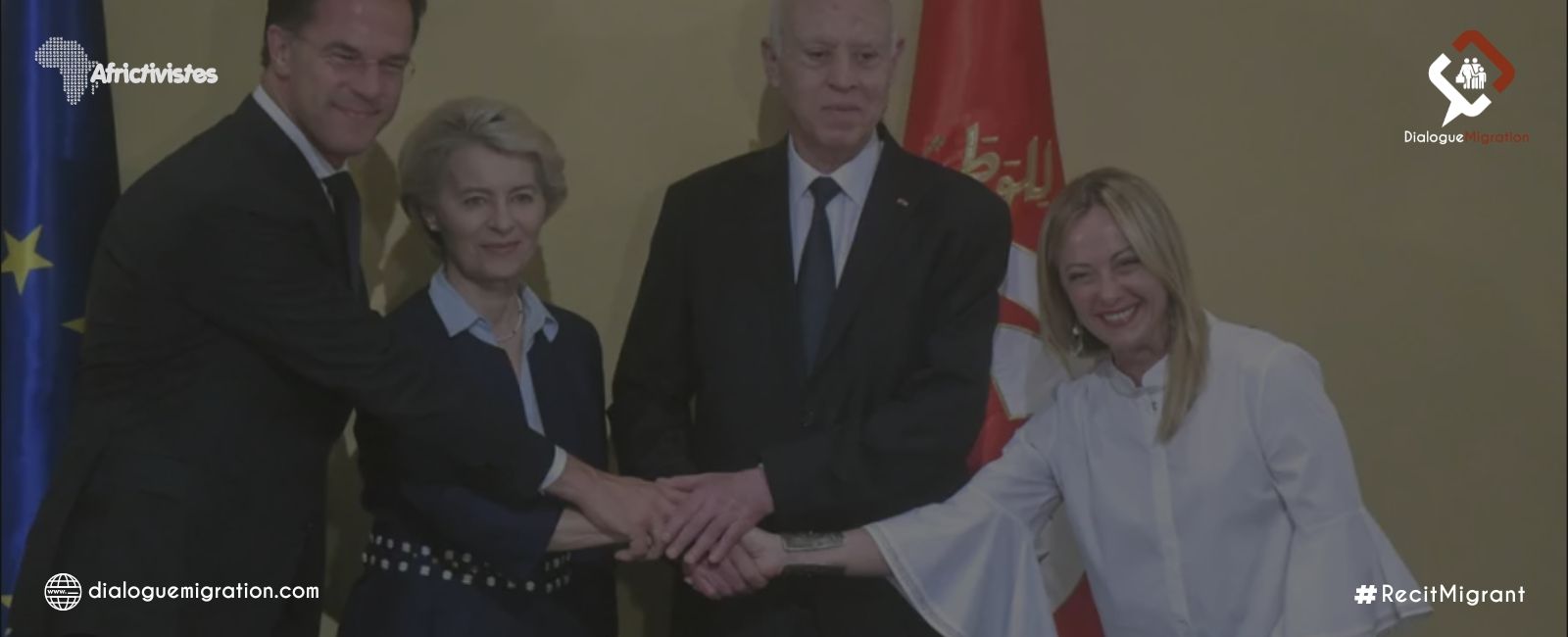

At the beginning of July 2023, the eyes of the world were riveted on the drama of migrants playing out in Tunisia. More than 700 migrants were turned back from Kais Saied’s country and taken to Libya where they were abandoned in the desert, at the mercy of bad weather, thirst, hunger and of course death. In the aftermath, the European Union (EU) and Tunisia signed a memorandum of understanding for a “comprehensive strategic partnership”. This agreement concerns the fight against illegal immigration. €105 million will be granted to Tunisia for this purpose. In the eyes of some analysts, this agreement is not the solution to the migration problem. They give their opinion on this agreement and propose possible solutions.
Tunisia will receive a total of €900 million from the European Union in the long term to fight immigration. And 105 million euros to be paid now. This will allow Tunisia, according to one of the terms of the agreement, to strengthen the control of its sea and land borders but also to prevent the transit of migrants in Tunisia without forgetting the fight against smugglers. The agreement comes at a time when migrants are facing inhumane treatment in Tunisia. This situation shocks public opinion and some analysts have not gone with the back of the spoon to decry this. This is the case of Dr. Evariste Nodjioutengar Djimasdé, a specialist in human rights and international criminal justice, who stresses that this partnership takes place in a particular context marked by xenophobia and racism both in Europe and Tunisia. “The duty of humanity, which could have led both to reach out to migrants, is completely absent. From the above, from an ethical point of view, this partnership does not hold at all, “ denounces Dr. Evariste Nodjioutengar Djimasdé.
François Gemenne, political scientist and specialist in migration, in this interview he gave to the television channel TV5 denounced the attitude but also the words of the Tunisian president because for him, the latter has not only distinguished himself by racist speeches but there have also been several anti-migrant rants in several cities of Tunisia. It considers that this aid of EUR 105 million is not relevant. “I fear that this is money that will be used to finance the process of criminalization and retaliation against sub-Saharan migrants,” expressed his concern before continuing, still in a posture of fear, that Tunisia will become the new Libya, a kind of hell on earth for migrants from sub-Saharan Africa.
Tunisia finally does the dirty work
Public opinion is wondering about Tunisia’s sudden turnaround, which had reminded Europe that it will not do the “dirty work” in its place. For Dr. Evariste Nodjioutengar Djimasdé, there is nothing surprising insofar as the Tunisian president could face economic and social pressures and realities. He notes that Tunisia has a faltering economy therefore “the economic and financial benefits that flow from this partnership have undoubtedly weighed in the decision-making in favor of the European Union”. For François Gemenne, this amount made available to Tunisia is money lost that “will be used to finance the process of criminalization and retaliation against sub-Saharan migrants”.
Repression cannot be considered the only solution to fight migration, says Dr. Evariste Nodjioutengar Djimasdé, who goes on to say that migration is a complex and multidimensional phenomenon, often motivated by factors such as the search for better economic opportunities, fleeing conflict and persecution, or political instability. He adds the plundering of Africa which is also one of the causes: “by systematically plundering Africa, supporting dictatorships and asphyxiating Africa through the CFA franc system, Europe is partly at the origin of these mass displacements”, he lists the long list of reasons for the departure of sub-Saharans to Europe, taking as an example “The destabilization of Libya by NATO forces under the instigation of the France terrorism has escalated in the Sahel, causing numerous human rights violations and at the same time causing mass departures of Africans.”
The solution to migration problems must not be repression
In the opinion of the specialist in human rights and international criminal justice, Dr. Evariste Nodjioutengar Djimasdé, the solution to migration problems is not and should not be repression because whatever means, he argues, the means deployed to deter or repress would-be migrants, the European Union will not succeed.
It believes that “the fight against migration must be addressed in a comprehensive and long-term manner, focusing on durable solutions such as the promotion of socio-economic development in countries of origin, the creation of decent living opportunities, conflict resolution and the protection of fundamental rights”.
François Gemenne, for his part, stresses that it is because it does not have a real common asylum and immigration policy that the EU turns to third countries, often countries hostile to migrants to solve problems that it cannot solve. For him “it is necessary to set up the European pact on asylum and immigration on which an agreement was recently reached”. That’s not all, because for him more than aid for African countries, it is necessary a partnership: “As long as we do not consider the countries of departure and transit as true partners in the common management of immigration, I fear that we will have a policy that will not work and that will not be effective”.
In a statement of July 31, 2023, the [1] Guinean government (Guinea Conakry) called on the leaders of the ECOWAS region to be concerned about the fate of young people who “live a human tragedy in Tunisia and the Mediterranean”. It also invites them to direct their “concerns towards strategic, socio-economic issues for the achievement of their aspirations”.


